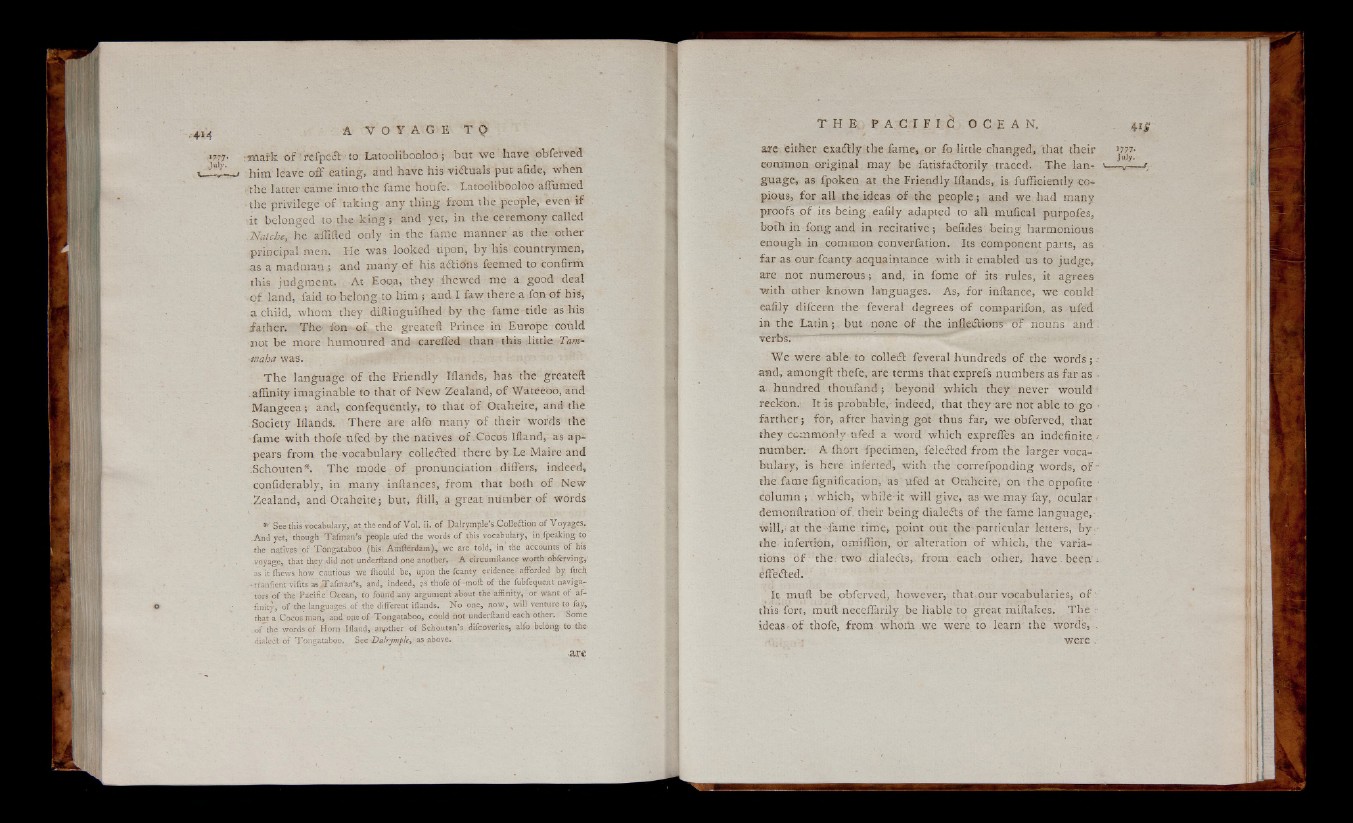
1777* ;<mark of rcfpcct'to Latooliboo.loo; but we have obferved
v. him leave off eating, and have his viXuals put afide, when
the latter came into the fame houfe. Latoolibooloo affumed
the privilege of taking any thing from the people, even if
■it belonged to the k in g ; and yet, in the ceremony called
.Niitche, he affifled only in the fame manner as the other
principal men. He was looked upon, by his countrymen,
.as a madman ; and many of his aXidns feemed to confirm
this., judgment. At Eooa, they fhewed me a good deal
o f land, faid to belong to him ; and I faw there a fon of his,
a child, whom they diftinguifhed by the fame title as his
father. The fon of ..the greateft: Prince in Europe could
not be more humoured and careifed than this .little. -Tam-
was.
The language of the Friendly Iilands, has the greateft
affinity imaginable to that of New Zealand, of Wateeoo, and
Mangeea; and, confequently, to that of Otaheite, and the
Society Hlands. There are alfo many of their words the
fame with thofe ufed by the natives of Cocos Ifland, as appears
from the vocabulary collefted there by Le Maire and
-Schouten*. The mode of pronunciation differs, indeed,
confiderably, in many inftances, from that both of New
Zealand, and Otaheite; but, ftill, a great number of words
*• See this vocabulary, at the end of Vol. ii. of Dalrymple’s Colleition of V oyages,
.And yet, though Tafman's people, ufed the words of this vocabulary, ih.fpeaking to
the natives of Tongataboo (his Amfterdarn), we are told, in the accounts bf his
voyage, that they .-did not underftand one another. A circumilance worth pbferving,'
as it ihews how cautious we ihoulci be,' upon the fcanty evidence afforded by fuch
-tranfient viftts as .Tafman’s, and, indeed, js thofe of moft of the fubfequentnavigators
of the Pacific Ocean, to found any argument about the affinity, or want of af-
o ■ finity,1 of the languages’ of .the different iilands. No one, now, will venture to fay,
that a Cocos man, and one of Tongataboo, .could hot underftand each other. Some,
of the words of Horn Ifland, anpther of Schouten’s difcoveries, alfo belong to the
dialect of Tongataboo. See Dalrymple, as above.
arc
are either exaXIy the fame, or fo little changed, that their
common original may be fatisfaXorily traced. The language,
as fpoken at the Friendly Iilands, is fufficiently copious,
for all the ideas of the people; and we had many
proofs, of its being eafiiy adapted to all mufical purpofes,
both in fong and in recitative; befides being harmonious
enough in common converfation. Its component parts, as
far as our fcanty acquaintance with it enabled us to judge,
are not numerous; and, in fome of its rules, it agrees
with other known languages. As, for inftance, we could
eafiiy difcer-n the feveral degrees of comparifon, as ufed
in the Latin; but none of the inflexions of nouns 'and
verbs. ~
We were able to colleX feveral hundreds of the words; :
and, amongft thefe, are terms that exprefs numbers as far as .
a hundred thoufand; beyond which they never would
reckon.- It is probable, indeed, that they are not able to go >
farther;. for, after having got thus far, we obferved, that
they commonly ufed a word which expreffes an indefinite..-
number. A ffiort fpecimerty feleXed from the larger voca- -
bulary, is here inferted, with the correfponding words, of"
the fame lignifieation, as ufed at Otaheite, on the oppofite ■
column ;. which, while-it will give, as we may fay, ocular -
demonilration of. their being dialeXs of the fame language,-
will,'at the fame time, point out the particular letters, by ■
the infertirdn, omiffion, or alteration of which, the variations
of the: two dialeXs,. from each other, have been 4
effeXed.
Jt mult be obferved, however, that our vocabularies, of:
this fort, muft neceffarily be liable to great miftakes. The |
ideas. of thofe, from whom we were, to learn the words, ,
were .